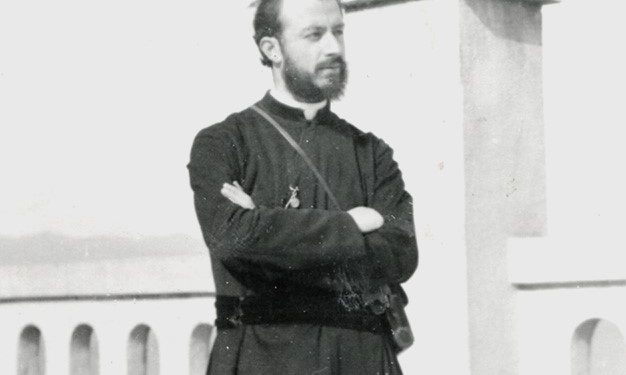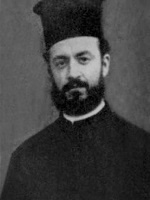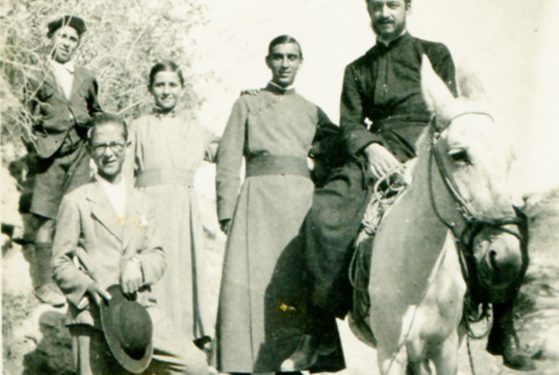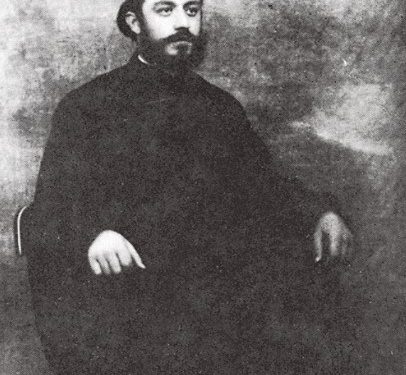Memorie.al / The barbaric persecution suffered by the Albanian Catholic Clergy immediately after the rise of communism to power in Albania is now fully known. Approximately 130 priests were arrested, imprisoned, tortured, and condemned without the slightest fault. The exact dimensions of this state terror can be found in the book titled: “The Martyrdom of the Albanian Catholic Church, 1944-1990,” compiled by an editorial board of eight authors, prominent personalities, and published in Shkodër in 1993.
The book lists the names of each victim included in that horror one by one. Those names are divided into seven groups, according to the suffering and consequences they endured. Thus, of the 129 arrested priests, 31 were executed by firing squad, 8 died under torture, 4 were drowned or poisoned, 3 died immediately after being released from prison, 24 died in prisons or internment camps, 38 died after being released from prison, and only 25 survived in 1990 and continued their priestly duty.
According to the authors’ calculation, all those arrested, taken together, completed 450 years of university studies and, taken together, were sentenced to 881 years of imprisonment and internment! The book also includes, among other things, the last words spoken by some of those executed before the firing squad. In those words, there is no cursing, no malediction, no hatred towards those who tortured and condemned them unjustly. Each, with their own words, expressed loyalty and dedication to faith and the Homeland.
Here we only give the words of Monsignor Frano Gjini, who, before the firing squad, declared: “Long Live Christ the King, Long Live Albania, even without Us!” (Book, p. 88). The authors of the text also followed the same path in their words. Thus, in the foreword, the author Vili Kamsi, after pointing out how inhumane the investigators and judges of this massacre were, ads:
“Reading about those described in this compilation will fill us with sorrow for those who suffered the highest martyrdom for Faith and Homeland, but at the same time, it should not incite the hatred of revenge against the communist criminals who caused so much suffering and misery to our people. May God forgive them?” (Book p. 2).
All the condemned priests were from the North, except for one who was from Elbasan, from the “Kala” (Castle) neighborhood. His name was Father Josif Papamihali, and he belongs to the group of four who were drowned and poisoned. The Papamihali family is among the oldest in the neighborhood, perhaps originating from a priest named Mihal.
Families with surnames of this nature still exist today in “Kala,” such as the families: Papajani, Papatruka, Papanikolla, etc. Among the oldest of the Papamihalis, Losh Papamihali, who lived in the 19th century, is remembered. He was a contemporary, friend, and close associate of Kristoforidhi.
He left his own memories about him in writing. During his life, Losh was known as a wise and very cheerful man. He was an organizer of walks and entertainment in Shijon, very fond of songs and dances. He dressed handsomely, mainly in white clothes, so in society; he earned the nickname “Losh the White.” He had no children, and perhaps he never married. He had a brother, Kostandin, who married and had two sons, Avi (Alqiviadh) and Mihal.
Both married and had ten children, who grew up together in the same house, where the descendants of Avi’s four sons and Mihal’s only son live today. After the birth of the children, the brothers died early, one after the other, and the orphans were raised by th1eir sisters-in-law, as if they were sisters. Josif was Avi’s first child. He was born on September 23, 1912. He attended the neighborhood’s elementary school, where he stood out as a bright, gentle, and diligent boy.
He finished it in 1923, and that same year, the missionary Archimandrite Pietro Scarpelli took him and sent him to continue his religious secondary education at the Greek Abbey of Grottaferrata in Rome. His religious formation began there. He finished that school in 1930 and the same year, began his higher religious studies in Theology and Philosophy at the Pontifical Greek College of St. Athanasius in Rome.
He graduated in 1936, was ordained a priest, and spent a few months near the Arbëresh people in Lungro, Calabria. The Apostolic Delegate in Albania took him from there and placed him as a priest in the Uniate Church of Saint Peter in Elbasan. He worked there for a few years, and starting in 1945, he was transferred to Korçë, Pogradec, Lushnje, Berat, etc., until he ended up in Korçë.
He was arrested there on October 31, 1946. He remained in prison until May 16, 1947, when his investigation began, concluding after about six months, on July 2, 1947. From August 1, 1947, until October 3, 1947, three court sessions were held, sentencing him to 5 years of deprivation of liberty and forced labor, charging him 108 Lek as a recourse tax. (Investigation Minutes, dated 3.10.1947)
The current descendants of Father Josif’s family have managed to find the minutes of the 13 investigation sessions and the three minutes of the three court sessions that decided the aforementioned sentence. By leafing through them, one understands what the accusations were and what defense the accused presented.
From the three court sessions above, it appears that Father Josif was accused as follows: “With the arrival of Italian Fascism in Albania, he demonstrated and sympathized with the occupier and was closely connected with other priests. After the liberation of Albania, he continued the reactionary policy of the Vatican.
He held meetings with reactionary elements, with whom he discussed issues against the People’s Power, and held meetings with Catholic leaders, with the aim of sabotaging the December 2 elections and establishing the Christian Democratic Party in Albania. He conducted propaganda against reforms…! He worked against the interests of the people and the Homeland, being subsidized with money by UNRRA agents to form clandestine organizations, such as the ‘Christian Democratic’ organization.” (Investigation Minutes, dated 1.8.1947)
Regarding these accusations, Father Josif was questioned in detail in every investigation session. He answered all questions one by one. Regarding his stance towards the fascist occupier, he stated that he opposed it because: “In the Church, I was involved with Albanian Catholics, celebrating Mass in Albanian!” (Investigation Minutes, dated 17.5.1947).
In another instance, he declared: “During the War, I remained neutral!” (Court Minutes, dated 1.8.1947). In every interrogation session, he emphasized that he never engaged in politics because religion strictly prohibits political propaganda for priests. Furthermore, regarding Albanian priests in general, he declared: “I do not know that any priest helped the National Liberation War, while there were many with the ‘Balli’ (Balli Kombëtar) and Legality, but I cannot say they officially participated!” (Investigation Minutes, dated 1.8.1947).
Regarding this period, he stated that he maintained contact with his superior or subordinate priests, without undertaking any activity against the government and the homeland. He also stated that the serious post-war accusations were unfounded. He admitted meeting and discussing with some of the people mentioned in the accusation, but said that he only had friendly and family ties with them.
He also stated that his connections with Catholic clergy were related to work in the Church and outside it. Thus, in the session dated 17.05.1947, speaking about the nuns of Korçë, who had opened an infant school (kindergarten) and an embroidery course for girls and women, he stated: “I advised the nuns not to engage in political issues, as it is categorically forbidden!” (Investigation Minutes, dated 17.05.1947).
He admitted that with another priest; “…we criticized the measures the State took against the Catholic Church of Elbasan and Korçë as unjust, as they were not involved in political issues!” (Minutes, dated 20.05.1947). He stated that he had no connection with UNRRA or its people. As for the money he distributed to his subordinates, he said he received it from superiors and distributed it as salaries. He specified how many napoleons he handed over to each person (Investigation Minutes, dated 20.05.1947).
Regarding their origin, he clarified: “This money came from the Episcopate of Durrës!” (Investigation Minutes, dated 20.05.1947). Regarding UNRRA’s humanitarian aid, he said: “The aid that UNRRA gives us is good for us” and “We said that being friends with the Anglo-Americans would be better for us” (Investigation Minutes, dated 16.05.1947).
The most serious accusation against Father Josif was the “sabotage” of the December 2, 1946 elections, and the “creation” of the Christian Democratic Party. The investigation focused heavily on these accusations. Of the 13 investigation sessions, 8 of them dealt with these matters.
The minutes of the first three are regularly and detailedly drafted. Reading them reveals everything expressed by the accused. The other five are irregular notes. They have few sentences, almost meaningless, and are without dates, except for the last minute. All are signed by another investigating person, noted as; “The charged person of the section.”
Taken together, these create the suspicion that they may not be real. From the answers given by Father Josif regarding the above accusations, it emerges that all the priests had gathered and discussed with each other, not to boycott the elections, but to determine whether it was appropriate or not for them to participate in the voting.
According to the Father’s words, it emerged that everyone was of the opinion that they should not vote, because the Front was led by the Communist Party, which was guided by anti-religious ideology, and that the deputies were irreligious or anti-religious. There were only two or three who thought of voting, aiming to protect and save the Catholic Church, which was heading; “towards a very difficult situation” (Investigation Minutes, undated).
(This was the time when weapons were “discovered” in the Church of Shkodër and when many priests had been arrested). Father Josif continued to say that regarding this issue, he had also asked his superior, the Bishop of Durrës, Monsignor Vincens Prenushi, if it was good to participate in the elections. He had replied: “This is not good, because it does not align with the religious principle, as the deputies have irreligious principles” (Investigation Minutes, dated 2.7.47).
The American Reaction: The Priest Was Buried Alive
Father Josif not only proved his innocence but was also dignified in the defense of his faith, the Pope, and the Vatican. He did this publicly in the two sessions of his trial, which “took place before a large public… the accused was brought and placed in his designated spot, unfortunately in a public session…!” (Court Minutes, 01.08.1947).
Precisely in this session, he declared: “As a law in faith, politics is forbidden,” “My mission in Albania is to develop the people in the Catholic faith,” “The Pope was not connected with Duce, as the Pope condemned the Doctrine of the Fascist Gentil!” (The word “gentil” should be “executioner” or “chief”). He continues below: “The Vatican has always loved Peace!” (all in the Court Minutes, dated 01.08.1947).
In the session the next day, about himself, he declared: “It was my desire and my ideal to study Faith and to wear this habit, to become a clergyman, as I am.” It seems that Father Josif Papamihali, even though he was before an open “grave,” remained faithful to his religious ideal. He was condemned even though completely innocent. He was not condemned to instantaneous death, like execution by firing squad, but to a “slow death” that would last not five minutes, but five years!
In truth, it “lasted” only about a year. Every day of that year, he “died” a little, fighting with the water, leeches, mud, difficult travel, lack of food, clothing, and sleep, in what became known as; “The Swamp of Death,” as his co-sufferer in the Swamp, the writer from Elbasan, Makensen Bungo, named it, who also made him a real character in his book titled; “The Swamp of Death.”
His last breath was not taken by the bullets of murderous rifles, but by the “murderous projectiles” of the hands of the criminals who drowned him alive in the mud and slime of the Swamp. But communism was “not satisfied” with this “slow execution.” It wanted to condemn him with a real execution. It “devised the trick” about 3 years later. Father Josif’s brother, Kostaq Papamihali, worked in Tirana as a simple accountant. A deficit was “discovered” in his accounts, it was exaggerated as a hostile act, and he was sentenced to death.
He was executed by firing squad in 1952, leaving his young wife a widow, and leaving his only son, who bore his grandfather’s name and was called Alqiviadh Papamihali, an orphan! This merciless and inhumane persecution was known throughout the world. The US Ambassador to the UN made it known in the February 1955 session when he presented his country’s report on political prisons in Albania.
Mentioning the ill-treatment of political prisoners of the time, he cited Father Josif’s case as an example, declaring: “The priest Josif Papamihali, head of the Uniate Church of Korçë, was buried alive in a ditch.” Father Josif Papamihali, in the courtroom during the session on August 1, 1947, in the presence of the judicial panel and the public in the hall, proved himself a true Albanian man.
He knew what awaited him. He had learned what had happened in Shkodër to the innocent priests there. He openly defended his faith, denouncing communist ideology and the state as its enemies.
This is why the Pope beatified this devout cleric for his Faith, declaring him a “Martyr of the Catholic Church.” Father Josif Papamihali, in the courtroom, showed that he held respect and love for his Homeland and the Divine, two precious characteristics of Albanianism.
This is why Albanianism should today declare him a “Martyr of Albanianism.” Bearing these qualities, his name was included in the history of the Martyrs of our Nation, alongside all those who gave their lives in the fight for justice and progress. Memorie.al















